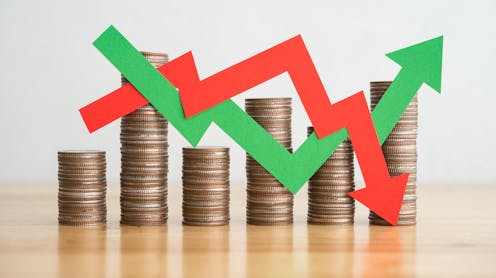Markets are choppy. What should you do with your super if you are near retirement?
- Written by Natalie Peng, Lecturer in Accounting, The University of Queensland

For Australians approaching retirement, recent market volatility may feel like more than just a bump in the road.
Unlike younger investors, who have time on their side, retirees don’t have the luxury of waiting out downturns. A sharp dip just before, or as you begin drawing down your superannuation, can leave lasting damage.
It’s not just about watching your super balance dip.
The real danger comes if you need to start withdrawing funds during a slump. Doing so can lock in losses and make it harder for your remaining savings to recover. The timing of poor market returns is known in finance circles as “sequencing risk[1]”. And it can shorten the life of your retirement savings.
What’s going on in markets?
So far in 2025, global shares as measured by the MSCI World Index[2] have fallen 4.6%. Concerns over stubborn inflation and trade tensions that will hurt growth are keeping investors on edge.
If your superannuation is in a “balanced” option, with diversified investments in stocks, bonds, private markets[3] and cash, your balance will have fallen by less than this amount.
Zoom out and the story looks better. Over the past year, total returns for the MSCI index remain strong, up 6.5%.
It’s a reminder that downturns are often followed by rebounds. We saw this during the COVID crash in 2020, when markets plummeted, only to recover more than 50% over the following year.
Still, for those nearing retirement, the timing of these dips matters more than the averages. Uncertainty makes planning all the more crucial.
Is your super still in high gear?
Many Australians don’t know exactly how their super is invested. Most people are in default “balanced” or “lifecycle” options, which automatically shift from high-growth assets like shares to safer investments like bonds and cash as retirement approaches.
This design helps cushion your balance from big market hits as you near retirement. But if you’ve chosen a high-growth option or haven’t reviewed your investment settings in years, you could still be heavily exposed to volatility.
In that case, now’s the time to consider your options:
delay retirement by a year or two to give your portfolio time to recover
move to part-time work instead of retiring fully, reducing how much super you need to draw down
review your budget. You can’t control the markets, but you can control your spending plans.
Don’t panic – reacting emotionally can cost you
When markets fall, it’s natural to feel the urge to switch your portfolio mix from stocks into cash. But this can turn temporary losses into permanent ones.
Instead, consider more measured steps. Transition-to-retirement strategies let you draw a partial income while keeping most of your super invested.
Annuities[5] – which offer guaranteed income for life or a fixed term – are another option. Newer products also address longevity risk, which is the risk of outliving your savings.
What does a 5% drop really mean?
Let’s say you’re 65 and have a super balance of A$200,000 (for men, that’s roughly the median[6]; for women, it’s lower due to factors like lower lifetime earnings and career breaks).
A 5% fall translates to a $10,000 loss. That might not seem huge, but if you were planning to draw down 5% of your balance annually – about $10,000 a year – that loss could effectively wipe out an entire year’s retirement income.
It doesn’t stop there. If left invested, that $10,000 could have continued to grow. Over a 20-year retirement, and assuming a 5% annual return, that $10,000 could have grown to over $26,000.
For retirees with smaller super balances or higher withdrawal rates, the impact of a market dip can be even more significant.
Many experts now expect long-term returns to be more modest than in recent decades. Ageing populations[8], climate change and shifting global dynamics[9] are likely to weigh on growth.
This makes it even more important to avoid switching entirely into cash, which can erode your savings through inflation over what could be a 20- or 30-year retirement.
A smarter path to retirement
The best approach is to gradually shift your investments in the years leading up to retirement – not all at once in response to a market dip. Lifecycle options do this automatically, but if you’re managing your super yourself, it’s worth getting advice.
Your super fund’s website likely offers tools and calculators to help. ASIC’s MoneySmart retirement planner[10] is another great resource. And don’t underestimate the value of calling your fund to ask:
How is my super invested?
Does this match my age and risk tolerance?
What are my options if I want to make changes?
The bottom line
Retiring in a volatile market isn’t easy, but panic isn’t a plan. By understanding your investment mix, taking advantage of flexible retirement strategies, and seeking advice when needed, you can navigate uncertainty more confidently.
Planning for retirement isn’t about avoiding all risk – it’s about managing it. With the right tools and mindset, you can stay on course, even when markets wobble.
Read more: How much do you need to retire? It's probably a lot less than you think[11]
References
- ^ sequencing risk (www.challenger.com.au)
- ^ MSCI World Index (markets.businessinsider.com)
- ^ private markets (theconversation.com)
- ^ Darren Baker/Shutterstock (www.shutterstock.com)
- ^ Annuities (moneysmart.gov.au)
- ^ roughly the median (www.superannuation.asn.au)
- ^ Shutterstock (www.shutterstock.com)
- ^ Ageing populations (www.oxfordeconomics.com)
- ^ climate change and shifting global dynamics (www.imf.org)
- ^ ASIC’s MoneySmart retirement planner (moneysmart.gov.au)
- ^ How much do you need to retire? It's probably a lot less than you think (theconversation.com)
Authors: Natalie Peng, Lecturer in Accounting, The University of Queensland







